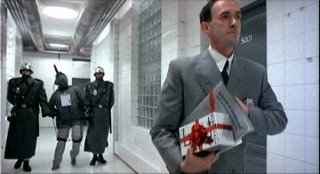Has Anybody Seen Sam Lowry?

Terry Gilliam’s 1985 film Brazil makes a profound declaration about the poverty of modern living. Clearly Orwellian, it portrays an atomized society where the people are subjugated to a system of deceptive images and technological barriers that isolate them from each other both physically and psychologically. As a critique Brazil seems more relevant today than when originally released. With plastic surgery and shopping all the rage, clever propaganda posted on every street corner, an unbearable paranoia regarding terrorism, and the acceptance of torture as a means of persuasion, the world of Brazil is only a slightly exaggerated version of the world we live in.
Stuck within this autocratic machine is the film’s protagonist, Sam Lowry, a dreamer and slacker, unconsciously searching for a way out. Suffering from a severe case of boredom Lowry often lapses into the dream state, where he has reoccurring fantasies of a particular woman he has never met. When he finally has a chance encounter with that woman, the scruffy Jill Layton, he is shaken from his weariness into a state of extreme giddiness, like someone who has fallen in love for the first time. Although Lowry never questions his position as a government agent he is quick to abuse that position in his romantic pursuit of Layton, and is even willing to cast it aside when he has convinced himself she is a terrorist. It is Lowry’s passionate drive towards Layton that gets him labeled a subversive by his peers, leading to his mental breakdown at the hands of an irrational government. While his eruption is a failure, snuffed out by the power of a totalitarian state, it is still genuine and raw, driven by a need for love, freedom, and poetry.
As a surrealist I have always identified with Lowry who, in spite of the corruption around him, persistently and magnetically follows his personal quest for love. Like Lowry, we too live in a corrupt terrain of technological overgrowth and psychological misery. Lowry sabotages this setting by opting to follow the trajectory of his dreams into his everyday life. Unfortunately, when all hope is lost, his dreams engulf, rather than harmonize with, his daily existence, demoting the question of dream and life to one of madness and delusion. Regardless of this closure, Lowry’s rejection of the reality those in power have created is a reminder to us that no system which undermines freedom can provide us with the intrinsic, emotive factors needed for the actualization of real life.
Brandon Freels